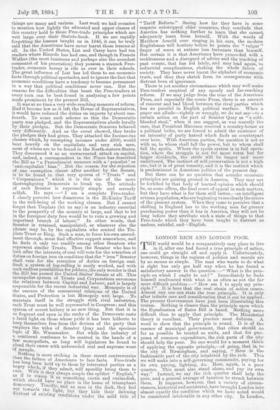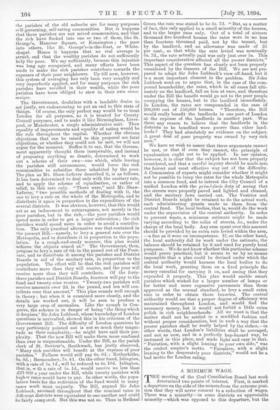LONDON RICH AND LONDON POOR. T HE world would be a
comparatively easy place to live in if, after one had found a true principle of action, one could go straight off and apply it. Unfortunately, however, things in the regions of politics and morals are by no means so simple. The man who wants to do what is right has only got half way when he has found a. satisfactory answer to the question :—" What is the prin- ciple on which I ought to act?" Immediately he finds himself confronted with what is as often as not the far- more difficult problem :—" How am I to apply my prin- ciple ?" It is here that the real strain of action comes. Almost any one can state the true principle. It is only after infinite care and consideration that it can be applied_ The present Government have just been illustrating this truism. Nothing is clearer than the principle upon which the Equalisation of Rates Bill is based. Nothing more• difficult than to apply that principle. The Ministerial theory is excellent. Their practice most dubious. A word to show that the principle is sound. It is of the essence of municipal government, that cities should as far as possible be treated as units, and that for pur- poses of common expenditure, the rich parts of the city should help the poor. No one would for a moment think- of applying the opposite principle,—of going, that is, to• the city of Birmingham, and saying, " Here is the fashionable part of the city inhabited by the rich. This we will make into a self-governing community, paying for its own paving, lighting, &c. Here, again, is a poor quarter. This must also stand alone, and pay its own way." Instead, we say the rich quarter shall help the poor, and a general average of taxation be struck between them. It happens, however, that a variety of circum- stances, historical and accidental, have brought London into. almost exactly the condition which we have noted would be considered intolerable in any other city. In London,. the parishes of the old suburbs are for many purposes self-governing, self-rating communities. But it happens that these parishes are not mixed communities, and that the rich have flocked into one or two of them, like St. George's, Hanover Square, or Kensington ; the poor into others, like St. George's-in-the-East, or White- chapel. Hence it happens that no real average is struck, and that the wealthy parishes do not sufficiently help the poor. We say sufficiently, because this injustice was long ago recognised, and many efforts have been made to make the rich parishes contribute towards the expenses of their poor neighbours. Up till now, however, this system of averaging has only been very roughly and very imperfectly applied, and for many purposes the rich parishes have revelled in their wealth, while the poor parishes have been obliged to stew iu their own sauce maigre. The Government, doubtless with a laudable desire to act justly, are endeavouring to put an end to this state of things. Of course, the only perfect way would be to treat London for all purposes, as it is treated for County Council purposes, and to make it like Birmingham, Liver- pool, or Manchester, a single administrative unit. Then equality of improvements and equality of rating would be the rule throughout the capital. Whether the obvious objections that can be raised to this proposal are fatal objections, or whether they could not be met, we will not argue for the moment. Suffice it to say, that the Govern- ment apparently thought them insuperable, and instead of proposing anything so drastic, determined to work out a scheme of their own—one which, while leaving the parishes still autonomous, would force the rich communities to subsidise those inhabited by the poor. The plan as Mr. Shaw-Lefevre described it, is as follows. It has been determined to deal only with the sanitary rate, and to apply the scheme of equalisation, or rather of relief, to this rate only. "There were," said Mr. Shaw- Lefevre, " two possible methods of dealing with it, the one to levy a rate on the whole of the Metropolis, and to .distribute it again in proportion to the expenditure of the several districts. It was obvious, however, that this would act as an inducement to extravagance, not merely in the ,poor parishes, but in the rich,—the poor parishes would spend more in order to get a larger subvention ; the rich parishes would spend more in order to avoid a contribu- tion. The only practical alternative was that contained in the present'Bill,—namely, to levy a general rate over the Metropolis, and to distribute it in proportion to the popu- lation. In a rough-and-ready manner, this plan would achieve the objects aimed at." The Government, then, propose to levy a rate of 6d. in the pound out of the Poor- rate, and to distribute it among the parishes and District Boards in aid of the sanitary rate, in proportion to the population. The effect will be that the rich parishes will contribute more than they will receive, and the poor will receive more than they will contribute. Of the forty- three parishes and District Boards, fourteen will pay to the fund and twenty-nine receive. " Twenty-two parishes will receive amounts over 2d. in the pound, and ten will con- -tribute over that amount." This plan sounds well- enough in theory ; but when it is examined more closely, and the details are worked out, it will be seen to produce a very large crop of anomalies. Like the nymph in Con- grave, the scheme is in danger of being the thing which it despises.' Sir John Lubbock, whose knowledge of London questions is unrivalled, showed this in his criticism of the Government Bill. The difficulty of London questions he very pertinently pointed out is not so much their magni- tude as their complexity,—he might have said their per- plexity. That the new Bill will make them more confused than ever is unquestionable. Under the Bill, as the parish clerk of St. Saviour's, Southwark, has justly observed, " Many rich parishes will benefit at the expense of poor parishes." Fulham would still pay 6s. 6d. ; Rotherhithe, 6s. 8d. ; Bermondsey, 7s. 41. On the other hand, Islington, with a rate of 5s. ld., will be reduced to 4s. 10d. Islington, that is, w:th a rate of 5s. Id., would receive no less than £21 000 a year under the Bill, while twenty parishes with higher rates would have to pay. In other words, the popu- lation basis for the redivision of the fund would in many eases work most unjustly. The Bill, argued Sir John Lubbock, assumed throughout that the nominal rates in different districts were equivalent to one another and could be fairly compared. But this was not so. Thus in Bethnal Green the rate was stated to be 6s. 7d. " But, as a matter of fact, this only applied to a small minority of the houses, and to the larger ones only. Out of a total of sixteen thousand five hundred houses the rates were in no less than fourteen thousand paid, not by the tenant, but by the landlord, and an allowance was made of 25 per cent., so that while the rate levied was nominally 6s. 7d., the rate actually paid was only just over 5s. This important consideration affected all the poorer districts." This aspect of the question has clearly not been properly considered by the framers of the Bill. We are not pre- pared to adopt Sir John Lubbock's view off-hand, but it is a most important element in the problem. Sir John Lubbock went on to argue that, in the case of the com- pound householder, the rates, which in all cases fall ulti- mately on the landlord, fall on him at once, and therefore under the Bill the benefit would go not to the poor people occupying the houses, but to the landlord immediately. In London, the rates are compounded in the case of 200,000 out of 550,000 houses. " Therefore, the Bill would really benefit the landlords in one part of London at the expense of the landlords in another part. Was there any reason to believe that the landlords in the districts to be benefited were poorer than other land- lords ? They had absolutely no evidence on the subject. A great deal of poor property was owned by very rich men."
We have no wish to assert that these arguments cannot be met, or that if even they cannot, the principle of equalisation ought not to be applied. In our opinion, however, it is clear that the subject has not been properly considered, and that a careful inquiry should be made into the fairest and most effective way out of the difficulty. A Commission of experts might consider whether it might not be possible to lump the rates for the whole Metropolis into a common fund, and to intrust the City Council of a unified London with the prima. facie duty of seeing that the streets were properly paved and lighted and cleaned, and the sanitary laws carried out. The Vestries and District Boards might be retained to do the actual work, each administering grants made to them from the central fund. The local bodies, that is, would do the work under the supervision of the central authority. In order to prevent waste, a minimum estimate might be made varying according to the miles of streets, &c., under the charge of the local body. Any sum spent over this amount should be provided by an extra rate levied within the area, —a fine as it were on incompetence. If, on the other hand, the local authority did its work under the estimate, the balance should be retained by it and used for purely local purposes. We do not know whether this particular scheme would prove practical, but it seems to us by no means impossible that a plan could be devised under which the central authority would harness the local bodies to do the local work, granting them on a fixed principle the money essential for carrying it on, and seeing that they expended it properly. This plan would enable smart parishes which wished for a larger number of lamps or for better and more expensive pavements than those approved as the normal standard, to levy a small extra rate in order to obtain those luxuries. The central authority would see that a proper degree of efficiency was maintained throughout London, and wouldfind the necessary money, but it would not forbid a little extra polish in rich neighbourhoods. All we want is that the matter shall not be settled in a muddled fashion and without proper consideration, but in such a way that the poorer parishes shall be really helped by the richer,—in other words, that London's liabilities shall be averaged, and not as now, and in a perfectly hap-hazard way, be increased in this place, and made light and easy in that. "Fairation, with a slight leaning to your own side," was the cricket umpire's motto, "Fairation, with a slight leaning to the desperately poor districts," would not be a bad motto for London rating.



































 Previous page
Previous page